李清照 如梦令英文版
李清照英文PPT

Statue of Li Qingzhao in the Li Qingzhao Memorial, Jinan
•
There are no secrets to success. It is the result of preparation, hard work, and learning from failure. - Colin L. P
poems
A Dream Lyric
Gust of wind and heavy rain came last night, Sound sleep hardly reduced the wine effect. I asked the house maid to examine the flower, Cherry-apple trees being fine is the answer. You know? Or you may not know? Flowers should be withered and leaves greener.
•
Southern Buddhist Idols
• • • • Early spring brings the warm day breezing, I cheer up with thin clothing. Having slept, I feel slightly cool, With withered plum flowers on my temple.
Li qingzhao
she was regarded as China's greatest female poet.
introduction
• • • • • •
• •
Born:1084 Death :1151 Birthplace:Shandong province Dynasty :Song dynasty Career: poet ,writer Compositions :
译者中心论下《如梦令·常记溪亭日暮》英译对比研究

译者中心论下《如梦令· 常记溪亭日暮》英译对比研究摘要:本文以译者中心论为视角出发,鉴赏《如梦令·常记溪亭日暮》徐忠杰和茅于美两个英译版本,并分析译者是如何发挥主体性来产生译文的。
通过探索该词的英译,寻求最佳翻译,以此提升读者对宋词的翻译能力与鉴赏能力。
关键词:宋词;译者中心;英译对比引言宋词,盛行于宋,是宋代文学成就最高标志,婉约派代表词人为李清照,代表作有《如梦令·常记溪亭日暮》。
本文从“译者中心论”出发,通过对比分析《如梦令》徐忠杰和茅于美的英译本,试图更深层次地探讨译者在宋词英译过程中的主体性,以此提升读者对宋词的翻译能力与鉴赏能力。
1.译者中心论胡庚申教授提出的翻译适应选择论将达尔文的“适应/选择”学说引入了译介研究,指出翻译是译者对以原文为典型要件的翻译生态环境的“适应”和以译者为典型要件的翻译生态环境对译文的“选择”。
在翻译活动中无论是“适应”还是“选择”,都是由“译者”完成的,译者集适应与选择一身。
译者中心论下译者主体性体现在译者翻译前和翻译中过程中均进行了适应与选择。
译者在译前需对源文本进行解读,根据翻译目的、出版社要求等适应性地选择翻译标准和策略,这就是适应性选择。
而语言、文化和交际环境这三者在翻译过程中通常需要做出适应性的选择转换。
下面本文将从李清照的《如梦令》这首词的英译本中具体分析译者中心论在其语言、文化和交际环境的适应选择中的体现。
二、《如梦令·常记溪亭日暮》赏析如梦令·常记溪亭日暮(宋·李清照)常记溪亭日暮,沉醉不知归路。
/兴尽晚回舟,误入藕花深处。
/争渡,争渡,惊起一滩鸥鹭。
这首小令,三十三字,无多余修饰,极具自然之美。
“溪亭”、“日暮”、“藕花”、“鸥鹭”这些意向构成了一幅清新淡雅的荷塘美景;同时,水声、桨声、笑声、鸟鸣声交织成一谱动人乐章。
落日入水,霞光满天,满池荷花,一幅烂漫的画卷呈现在眼前,少女洋溢的青春及游玩的乐趣清晰可见,令人如声临其境,不由得想随她一起,忽地行至藕花深处,沉醉而不知归处。
李清照的词十首【《如梦令》英译文赏析】
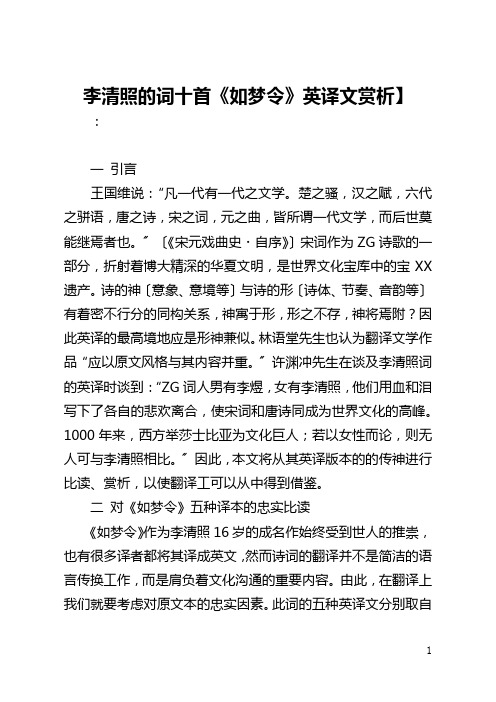
李清照的词十首《如梦令》英译文赏析】:一引言王国维说:“凡一代有一代之文学。
楚之骚,汉之赋,六代之骈语,唐之诗,宋之词,元之曲,皆所谓一代文学,而后世莫能继焉者也。
〞〔《宋元戏曲史・自序》〕宋词作为ZG诗歌的一部分,折射着博大精深的华夏文明,是世界文化宝库中的宝XX 遗产。
诗的神〔意象、意境等〕与诗的形〔诗体、节奏、音韵等〕有着密不行分的同构关系,神寓于形,形之不存,神将焉附?因此英译的最高境地应是形神兼似。
林语堂先生也认为翻译文学作品“应以原文风格与其内容并重。
〞许渊冲先生在谈及李清照词的英译时谈到:“ZG词人男有李煜,女有李清照,他们用血和泪写下了各自的悲欢离合,使宋词和唐诗同成为世界文化的高峰。
1000年来,西方举莎士比亚为文化巨人;若以女性而论,则无人可与李清照相比。
〞因此,本文将从其英译版本的的传神进行比读、赏析,以使翻译工可以从中得到借鉴。
二对《如梦令》五种译本的忠实比读《如梦令》作为李清照16岁的成名作始终受到世人的推崇,也有很多译者都将其译成英文,然而诗词的翻译并不是简洁的语言传换工作,而是肩负着文化沟通的重要内容。
由此,在翻译上我们就要考虑对原文本的忠实因素。
此词的五种英译文分别取自于龚景浩、黄宏荃、徐忠杰、许渊冲、丁祖馨这五个人的英译版本。
下面笔者将对五位译者的译句进行一一比读:1 “昨夜雨疏风骤〞龚景浩将“昨夜雨疏风骤,分成两个部分。
将“风骤〞另起了一行,其含义无疑是更加突出了风之猛,而且也为下文词人自己对当前时令给海棠花造成的损害做了一个深深的伏笔。
由于海棠花经过了一夜的洗礼,怎么能够“照旧〞呢?肯定就是“落花满地〞才是。
因此词人不用去户外,只以其敏感细腻的心灵去感觉,也能知道确定是一幅“绿肥红瘦〞的狼藉景象了;黄宏荃将“fierce wind〞放在了前面,将几点摧花语置后,也是试图突出风的猛烈;徐忠杰的译文将昨夜作为了主语,对于风有多大并没有明确说明,只是描述了昨夜的气候是风加雨;许渊冲的译文和黄宏荃的类似,只是黄先生的显得更加动态一些;丁祖馨的译文有意仿照中文的短语形式,仅用了三个词组陈设开来,稍显不连贯。
李清照的《如梦令》究竟写了什么

【文学研究】DOI :10.14168/j .issn .1672-8572.2015.02.19李清照的枟如梦令枠究竟写了什么艾荫范①(阜新市社会科学界联合会,辽宁阜新 123000)摘 要:小令中描写的直观场景埋伏两重喻意:“绿肥红瘦”指代春光渐去是转喻层面,这是至今被读者所赏识的;但海棠和绿暗红稀又暗示美人迟暮,这是其隐喻层面。
开掘出后者,乃见这首词系李、赵一双青年夫妇闺中的诗性调侃和情感交流。
关键词:李清照;如梦令;转喻;隐喻中图分类号:I027.23 文献标志码:A 文章编号:1672-8572(2015)02-0106-04 凡是接触过宋词的文学爱好者,几乎无不熟知李清照的这首枟如梦令枠: 昨夜雨疏风骤,浓睡不消残酒。
试问卷帘人,却道海棠依旧。
知否?知否?应是绿肥红瘦。
因为语言清浅,无须注释帮助读者也都明白词的字面意思:一夜风雨疏狂,词人因酒醉而睡至天明方醒。
她忽然念及窗前的花草,连忙问“卷帘人”情况如何,对方回答说平安无事,海棠开放如旧。
但词人对这个回答并不满意,她认为对方观察片面———海棠尽管照开,可是经一番风雨,春光就会老却一层,现在肯定是花朵越来越少,叶子越来越密,说明春季即将让位给夏天了。
词人对自然界美好生命的珍怜,对易逝春光的顾惜,从词的后半两问一断中清楚地反映出来。
20世纪60年代笔者在辽大中文系当助教,听我的朋友左成文在课堂上如是解说,他当时依据的有朱东润主编的高校教材和胡云翼先生的枟宋词选枠。
以后近半个世纪,我又接触到其他老一辈学者,如俞平伯、周汝昌诸先达的讲疏,还有同作为高校教材而产生于新千年的袁行霈主编的枟中国文学史枠和袁世硕主编的枟中国古代文学作品选枠,可以说众口一词,无一例外,都统一于这个口径。
可是,这首词写的果真是上述内容吗?笔者不以为然。
从听朋友的课至今50年,我一直坚持自己的另一套分疏别解。
考虑到这篇小令几乎是读宋词必跨的门槛儿,而又自信有比诸家更充分的理由,所以愿意立个题目略陈拙见,就正于方家乃至广大宋词爱好者。
翻译成英文的唯美古诗英文版

翻译成英文的唯美古诗英文版【篇一】翻译成英文的唯美古诗英文版七言古诗柳宗元渔翁渔翁夜傍西岩宿,晓汲清湘燃楚烛。
烟销日出不见人,欸乃一声山水绿。
回看天际下中流,岩上无心云相逐。
Seven-character-ancient-verseLiu ZongyuanAN OLD FISHERMANAn old fisherman spent the night here, under the western cliff;He dipped up water from the pure Hsiang and made a bamboo fire;And then, at sunrise, he went his way through the cloven mist,With only the creak of his paddle left, in the greenness of mountain and river.I turn and see the waves moving as from heaven,And clouds above the cliffs coming idly, one by one.【篇二】翻译成英文的唯美古诗英文版李颀古从军行白日登山望烽火,黄昏饮马傍交河。
行人刁斗风沙暗,公主琵琶幽怨多。
野云万里无城郭,雨雪纷纷连大漠。
胡雁哀鸣夜夜飞,胡儿眼泪双双落。
闻道玉门犹被遮,应将性命逐轻车。
年年战骨埋荒外,空见葡萄入汉家。
Folk-song-styled-verseLi QiAN OLD WAR-SONGThrough the bright day up the mountain, we scan the sky for a war-torch;At yellow dusk we water our horses in the boundaryriver;And when the throb of watch-drums hangs in the sandy wind,We hear the guitar of the Chinese Princess telling her endless woe....Three thousand miles without a town, nothing but camps,Till the heavy sky joins the wide desert in snow.With their plaintive calls, barbarian wildgeese fly from night to night,And children of the Tartars have many tears to shed;But we hear that the Jade Pass is still under siege, And soon we stake our lives upon our light warchariots. Each year we bury in the desert bones unnumbered,Yet we only watch for grape-vines coming into China.【篇三】翻译成英文的唯美古诗英文版乐府王维洛阳女儿行洛阳女儿对门居,才可容颜十五余;良人玉勒乘骢马,侍女金盘脍鲤鱼。
从目的论看许渊冲翻译李清照词的英译
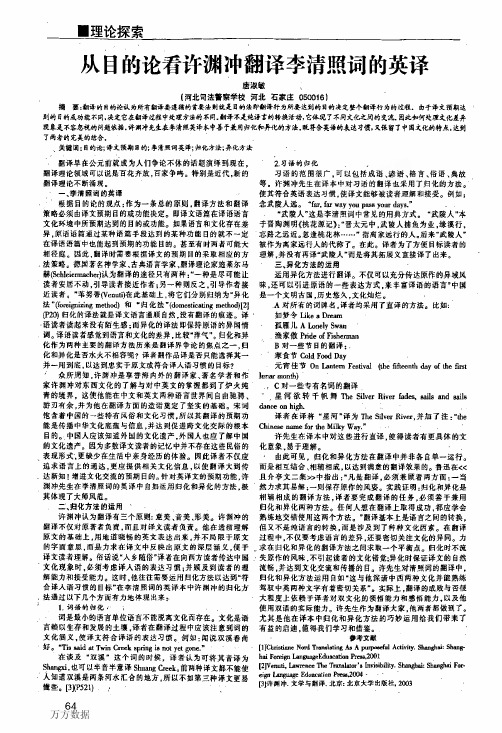
解能力和接受能力。速时,他往往需要运用归化方法以达到“符 归化和异化方法运用自如“这与他深谙中西两种文化并能熟练
合译人语习惯的目标”在李清照词的英译本中许渊冲的归化方 驾驭中英两种文字有着密切关系”。实际上.翻译的成败与否很
法通过以下几个方面有力地体现出来}
大程度上依赖于译者对双文化的领悟能力和感悟能力.以及他
2.期刊论文 孙婷.李莎 目的论与歌词英汉翻译之标准 -安徽文学(下半月)2010(2)
目的论认为翻译方法或策略必须由译文预期目的或功能来决定.本论文主要以德国译界功能派翻译理论目的论为指导来对英语歌词的汉译进行探讨 ,尤其强调文化差异对歌词翻译策略的影响.本文以目的论为依据,先介绍了目的论以及其法则,然后分析了译者在翻译过程中选用翻译方法的重要性,并选 了若干译例与读者进行了商榷.
异,原语语篇通过某种语篇手段达到的某种功能目的就不~定 忘路之远近。忽逢桃花林……”指离家远行的人。后来。武陵人”
在译语语篇中也能起到预期的功能目的。甚至有时两者可能大 被作为离家远行人的代称了。在此。译者为了方便目标读者的
相径庭。因此,翻译时需要根据译文的预期目的采取相应的方 理解,并没有再译“武陵人”而是将其拓展翻译大家。他两者都做到了。
词是最小的语言单位语言不能脱离文化而存在。文化是语 尤其是他在译本中归化和异化方法的巧妙运用给我们带来了
言赖以生存和发展的土壤.译者在翻译过程中应该注意到词的 有益的启迪。值得我们学习和借鉴。
文化涵义,使译文符合潭语的表达习惯。倒如:闻说双溪春尚 好o。Tis蛐id atTwinCr∞k sp血gi8 not yet雕le”
7.学位论文 王丽凤 功能主义目的论视角下的公示语汉英翻译 2008
随着我国经济的发展,改革开放的深入和国际地位的提高,对外联系和国际交流日益频繁,英语已经渗透到中国社会的各个角落。城市公共场所的 双语标识牌随处可见,在指示、引导、警示等方面起到重要作用。公示语也成为了外国人了解中国文化的一个窗口。
古诗词英文版
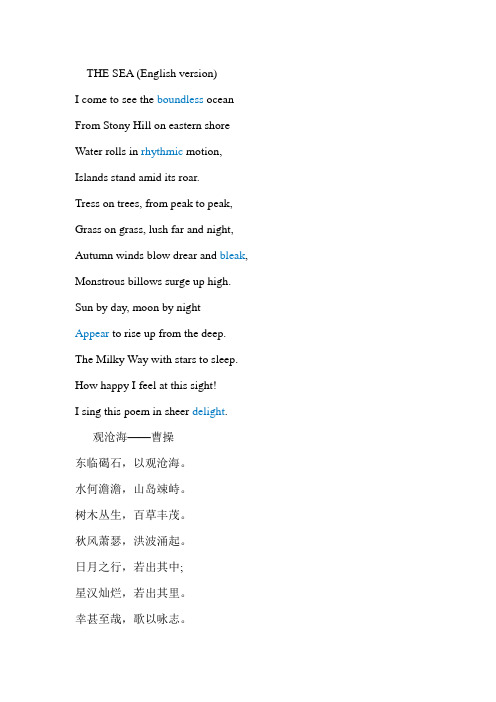
THE SEA (English version)I come to see the boundless ocean From Stony Hill on eastern shore Water rolls in rhythmic motion, Islands stand amid its roar.Tress on trees, from peak to peak, Grass on grass, lush far and night, Autumn winds blow drear and bleak, Monstrous billows surge up high. Sun by day, moon by nightAppear to rise up from the deep. The Milky Way with stars to sleep. How happy I feel at this sight!I sing this poem in sheer delight.观沧海——曹操东临碣石,以观沧海。
水何澹澹,山岛竦峙。
树木丛生,百草丰茂。
秋风萧瑟,洪波涌起。
日月之行,若出其中;星汉灿烂,若出其里。
幸甚至哉,歌以咏志。
古诗词英文版1. 但愿人长久,千里共婵娟。
We wish each other a long life so as to share the beauty of this graceful moonlight, even though miles apart.2. 独在异乡为异客,每逢佳节倍思亲。
A lonely stranger in a strange land I am cast, I miss my family all the more on every festive day.3. 大江东去,浪淘尽,千古风流人物。
The endless river eastward flows; with its huge waves are gone all those gallant heroes of bygone years.4.二人同心,其利断金。
英文版古诗
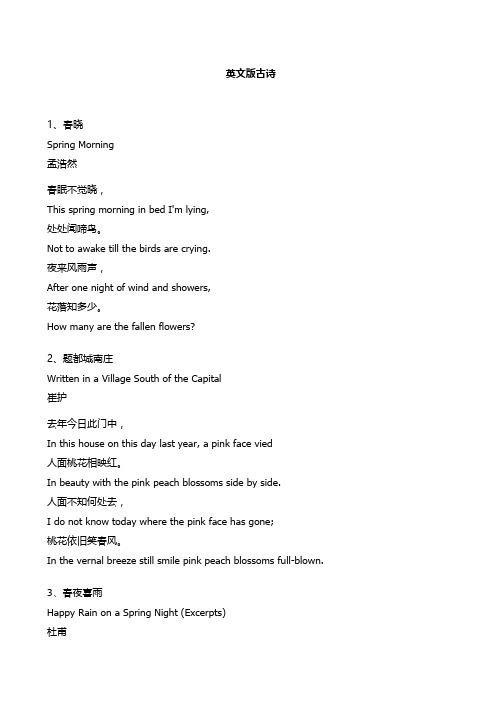
英文版古诗1、春晓Spring Morning孟浩然春眠不觉晓,This spring morning in bed I'm lying,处处闻啼鸟。
Not to awake till the birds are crying.夜来风雨声,After one night of wind and showers,花落知多少。
How many are the fallen flowers?2、题都城南庄Written in a Village South of the Capital崔护去年今日此门中,In this house on this day last year, a pink face vied人面桃花相映红。
In beauty with the pink peach blossoms side by side.人面不知何处去,I do not know today where the pink face has gone;桃花依旧笑春风。
In the vernal breeze still smile pink peach blossoms full-blown.3、春夜喜雨Happy Rain on a Spring Night (Excerpts)杜甫好雨知时节,Good rain knows its time right;当春乃发生。
It will fall when comes spring.随风潜入夜,With wind it steals in night;润物细无声。
Mute, it moistens each thing.4、忆江南Dreaming of the Southern Shore白居易江南好,Fair Southern shore,风景旧曾谙。
With scenes I adore.日出江花红胜火,At sunrise riverside flowers redder than fire,春来江水绿如蓝。
《如梦令》英文翻译
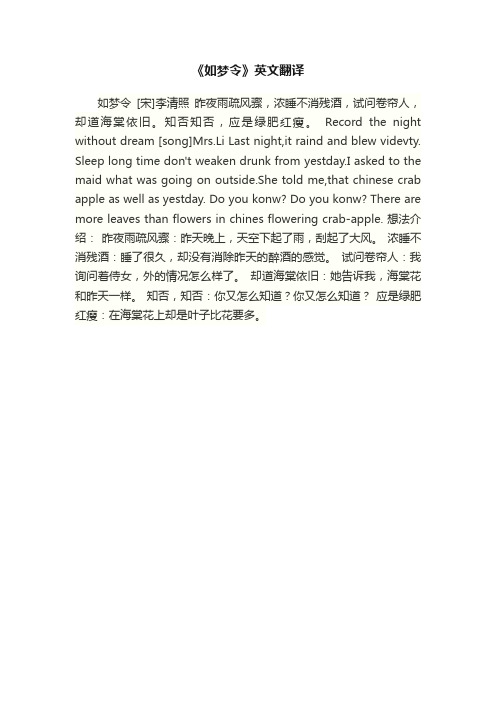
《如梦令》英文翻译
如梦令[宋]李清照昨夜雨疏风骤,浓睡不消残酒,试问卷帘人,却道海棠依旧。
知否知否,应是绿肥红瘦。
Record the night without dream [song]Mrs.Li Last night,it raind and blew videvty. Sleep long time don't weaken drunk from yestday.I asked to the maid what was going on outside.She told me,that chinese crab apple as well as yestday. Do you konw? Do you konw? There are more leaves than flowers in chines flowering crab-apple. 想法介绍:昨夜雨疏风骤:昨天晚上,天空下起了雨,刮起了大风。
浓睡不消残酒:睡了很久,却没有消除昨天的醉酒的感觉。
试问卷帘人:我询问着侍女,外的情况怎么样了。
却道海棠依旧:她告诉我,海棠花和昨天一样。
知否,知否:你又怎么知道?你又怎么知道?应是绿肥红瘦:在海棠花上却是叶子比花要多。
中国诗词翻译成英文诗歌

中国诗词翻译成英文诗歌诗歌诉诸浪漫主义,使人们超然在这个辛苦劳作和单调无聊的世界之上,获得一种感情的升华。
店铺整理了中国诗词翻译成英文诗歌,欢迎阅读!中国诗词翻译成英文诗歌篇一纳兰性德《菩萨蛮》窗前桃蕊娇如倦,东风泪洗胭脂面。
人在小红楼,离情唱《石洲》。
夜来双燕宿,灯背屏腰绿。
香尽雨阑珊,薄衾寒不寒?Buddhist DancersNalanshindeDelicate are the peach blossoms before the window,Tears streaming down the rouge face in the easterly wind.The person in the small red floor,Chanting in the most bitter touch of parting sorrow.The couple swallows lodging for the night,Their silhouette becomes dimmed on the mid-screen.The incense burns out in the rain drawing to a close,And in the thin quilt, are you all right?(吴松林译)中国诗词翻译成英文诗歌篇二张炎《壶中天》扬舲万里,笑当年底事,中分南北。
须信平生无梦到,却向而今游历。
老柳官河,斜阳古道,风定波犹直。
野人惊问,泛槎何处狂客?迎面落叶萧萧,水流沙共远,都无行迹。
衰草凄迷秋更绿,唯有闲鸥独立。
浪挟天浮,山邀云去,银浦横空碧。
扣舷歌断,海蟾飞上孤白。
Sky in a VaseCrossing the Yellow River at NightZhang YanI sail a boat for miles and milesAnd ask with smilesWhy should the Yellow River then divideThe land into northern and southern sides?I believe all my life long I have not a dreamOf the Yellow River, but how I see the stream. The rivershore with willow trees,The ancient pathways in departing sunrays, The waves seem straight when calms the breeze.People ask me in surprise:Why should I said a boat at moonrise?Leaves fall shower by shower in my face,Water with sand flows far away.Without leaving a trace. Withered grass veils Autumn’s green lands.Only a gull at leisure stands.The skies on surging waves float;Mountains invite the clouds to come down from on high.The Silver River bars the blue sky.I sing and beat on the deck of my boat.The lonely moon in flightHas turned the Yellow River bright.中国诗词翻译成英文诗歌篇三张炎《水龙吟·白莲》仙人掌上芙蓉,涓涓犹滴金盘露。
60首中英文对照古诗

60首中英文对照古诗 目录1.《登鹳雀楼》(唐)王之涣2.《赋得古原草送别》(唐)白居易3.《七步诗》(魏)曹植4.《游子吟》(唐)孟郊5.《竹里馆》(唐)王维6.《长歌行》(汉)乐府7.《敕勒歌》(北朝)乐府8.《出塞》(唐)王昌龄9.《春夜喜雨》(唐)杜甫10.《观沧海》(魏)曹操11.《黄鹤楼》(唐)崔颢12.《枫桥夜泊》(唐)张继13.《黄鹤楼送孟浩然之广陵》(唐)李白14.《回乡偶书》(唐)贺知章15.《宿建德江》(唐)孟浩然16.《九月九日忆山东兄弟》(唐)王维17.《鹿柴》(唐)王维18.《凉州词》(唐)王之涣19.《逢雪宿芙蓉山主人》(唐)刘长卿20.《秋浦歌》(唐)李白21.《送元二使安西》(唐)王维22.《题西林壁》(宋)苏轼23.《望庐山瀑布》(唐)李白24.《寻隐者不遇》(唐)贾岛25.《忆江南》(唐)白居易26.《秋词》(唐)刘禹锡27.《咏柳》(唐)贺知章28.《赠汪伦》(唐)李白29.《秋夕》(唐)杜牧30.《登乐游园》(唐)李商隐31.《滁州西涧》(唐)韦应物32.《从军行》(唐)王昌龄33.《大风歌》(汉)刘邦34.《商山早行》(唐)温庭筠35.《龟虽寿》(汉)曹操36.《惠崇春江晚景》(宋)苏轼37.《江南春绝句》(唐)杜牧38.《闻乐天左降江州司马》(唐)元稹39.《绝句》(唐)杜甫40.《清明》(唐)杜牧41.《如梦令》(宋) 李清照42.《石灰吟》(明) 于谦43.《越中览古》(唐)李白44.《独坐敬亭山》(唐)李白45.《望岳》(唐)杜甫46.《元日》(宋)王安石47.《早春呈水部张十八员外》(唐)韩愈48.《江南逢李龟年》(唐)杜甫49.《竹枝词》(唐)刘禹锡50.《望天门山》(唐)李白51.《望洞庭》(唐)刘禹锡52.《浪淘沙》(唐)刘禹锡53.《山行》(唐)杜牧54.《饮湖上初晴后雨》(宋)苏轼55.《竹石》(清)郑燮56.《己亥杂诗之一二五》(清)龚自珍57.《春思》(唐)李白58.《赠李白》(唐)杜甫59.《暮江吟》(唐)白居易60.《归园田居五首(其三)》(晋)陶渊明1.登鹳雀楼(唐)王之涣白日依山尽,黄河入海流。
李清照《声声慢》(寻寻觅觅,冷冷清清)三种版本英译
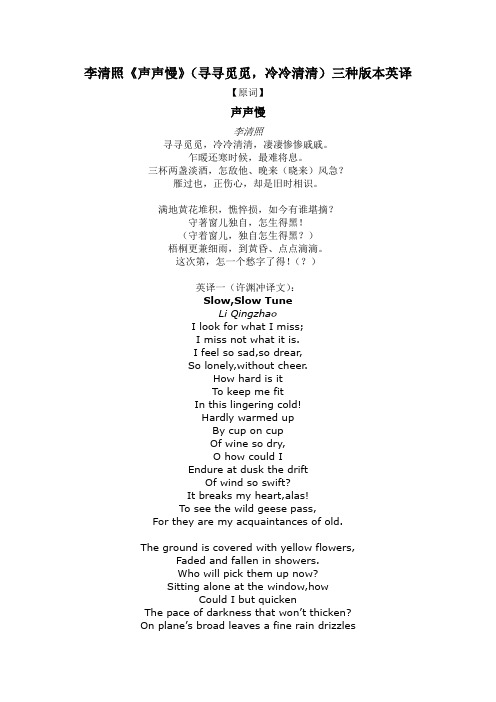
李清照《声声慢》(寻寻觅觅,冷冷清清)三种版本英译【原词】声声慢李清照寻寻觅觅,冷冷清清,凄凄惨惨戚戚。
乍暖还寒时候,最难将息。
三杯两盏淡酒,怎敌他、晚来(晓来)风急?雁过也,正伤心,却是旧时相识。
满地黄花堆积,憔悴损,如今有谁堪摘?守著窗儿独自,怎生得黑!(守着窗儿,独自怎生得黑?)梧桐更兼细雨,到黄昏、点点滴滴。
这次第,怎一个愁字了得!(?)英译一(许渊冲译文):Slow,Slow TuneLi QingzhaoI look for what I miss;I miss not what it is.I feel so sad,so drear,So lonely,without cheer.How hard is itTo keep me fitIn this lingering cold!Hardly warmed upBy cup on cupOf wine so dry,O how could IEndure at dusk the driftOf wind so swift?It breaks my heart,alas!To see the wild geese pass,For they are my acquaintances of old.The ground is covered with yellow flowers,Faded and fallen in showers.Who will pick them up now?Sitting alone at the window,howCould I but quickenThe pace of darkness that won’t thicken?On plane’s broad leaves a fine rain drizzlesAs twilight grizzles.O what can I do with a griefBeyond belief?———摘自《宋词三百首鉴赏》(汉英对照),P682。
李清照英文版简介
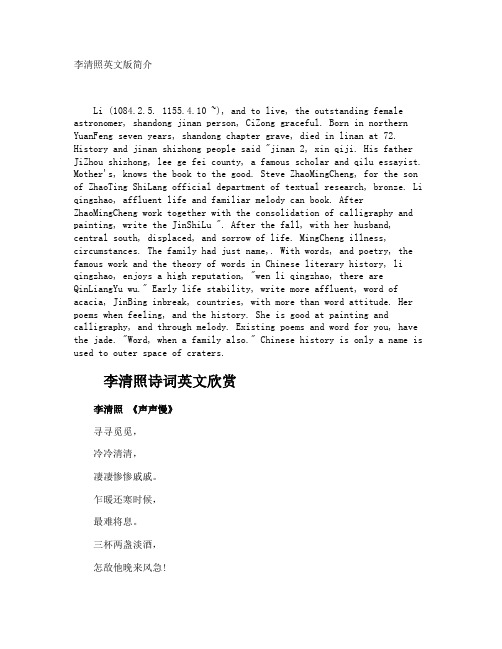
李清照英文版简介Li (1084.2.5. 1155.4.10 ~), and to live, the outstanding female astronomer, shandong jinan person, CiZong graceful. Born in northern YuanFeng seven years, shandong chapter grave, died in linan at 72. History and jinan shizhong people said "jinan 2, xin qiji. His father JiZhou shizhong, lee ge fei county, a famous scholar and qilu essayist. Mother's, knows the book to the good. Steve ZhaoMingCheng, for the son of ZhaoTing ShiLang official department of textual research, bronze. Li qingzhao, affluent life and familiar melody can book. After ZhaoMingCheng work together with the consolidation of calligraphy and painting, write the JinShiLu ". After the fall, with her husband, central south, displaced, and sorrow of life. MingCheng illness, circumstances. The family had just name,. With words, and poetry, the famous work and the theory of words in Chinese literary history, li qingzhao, enjoys a high reputation, "wen li qingzhao, there are QinLiangYu wu." Early life stability, write more affluent, word of acacia, JinBing inbreak, countries, with more than word attitude. Her poems when feeling, and the history. She is good at painting and calligraphy, and through melody. Existing poems and word for you, have the jade. "Word, when a family also." Chinese history is only a name is used to outer space of craters.李清照诗词英文欣赏李清照《声声慢》寻寻觅觅,冷冷清清,凄凄惨惨戚戚。
如梦令·常记溪亭日暮英文版

如梦令·常记溪亭日暮英文版"如梦令·常记溪亭日暮"是一首中国古代诗歌,作者是宋代文学家李清照。
虽然这首诗在英文中没有一个官方的翻译版本,但我们可以尝试用英文表达这首诗的意思和情感。
In the dream-like song, "Constantly Remembering the Evening at the Stream Pavilion," the poet Li Qingzhao captures the beauty and melancholy of a sunset scene by the river. The poem evokes a sense of nostalgia and longing, as the poet reflects on the fleeting nature of life and the passing of time.As the evening sun sets, the poet stands by the stream pavilion, cherishing the memories of a past encounter. The surroundings are described with vivid imagery, depicting the serene atmosphere, the sound of flowing water, and the fading light. The poet's heart is filled with a mix of emotions, from joy and sorrow to a deep sense of longing.The poem beautifully portrays the transient nature ofhuman existence and the bittersweet feelings associated with memories. It reminds us of the impermanence of life and the importance of treasuring each moment. Li Qingzhao's "Constantly Remembering the Evening at the Stream Pavilion" resonates with readers across time and culture, capturing the universal human experience of love, loss, and the passage of time.Please note that the above is not an official translation of the poem, but rather an attempt to conveyits essence and emotions in English.。
夏日绝句英语版
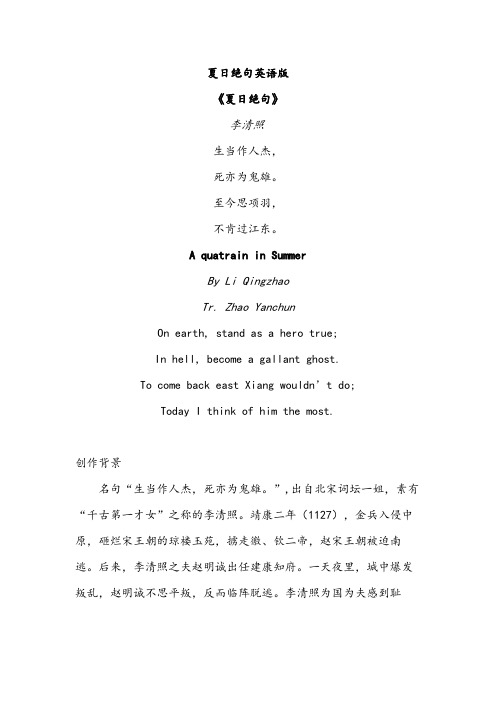
夏日绝句英语版《夏日绝句》李清照生当作人杰,死亦为鬼雄。
至今思项羽,不肯过江东。
A quatrain in SummerBy Li QingzhaoTr. Zhao YanchunOn earth, stand as a hero true;In hell, become a gallant ghost.To come back east Xiang wouldn’t do;Today I think of him the most.创作背景名句“生当作人杰,死亦为鬼雄。
”,出自北宋词坛一姐,素有“千古第一才女”之称的李清照。
靖康二年(1127),金兵入侵中原,砸烂宋王朝的琼楼玉苑,掳走徽、钦二帝,赵宋王朝被迫南逃。
后来,李清照之夫赵明诚出任建康知府。
一天夜里,城中爆发叛乱,赵明诚不思平叛,反而临阵脱逃。
李清照为国为夫感到耻辱,在路过乌江时,有感于项羽的悲壮,创作此诗,同时也有暗讽南宋王朝和自己丈夫之意。
李清照(1084-约1151)南宋女词人。
号易安居士,齐州章丘(今属山东)人。
父李格非为当时著名学者,夫赵明诚为金石考据家。
早期生活优裕,与明诚共同致力于书画金石的搜集整理。
金兵入据中原,流寓南方,明诚病死,境遇孤苦。
所作词,前期多写其悠闲生活,后期多悲叹身世,情调感伤,有的也流露出对中原的怀念。
形式上善用白描手法,自辟途径,语言清丽。
论词强调协律,崇尚典雅、情致,提出词“别是一家”之说,反对以作诗文之法作词。
并能诗,留存不多,部分篇章感时咏史,情辞慷慨,与其词风不同。
有《易安居士文集》、《易安词》,已散佚。
后人有《漱玉词》辑本,今人有《李清照集校注》。
如梦令英文翻译.doc
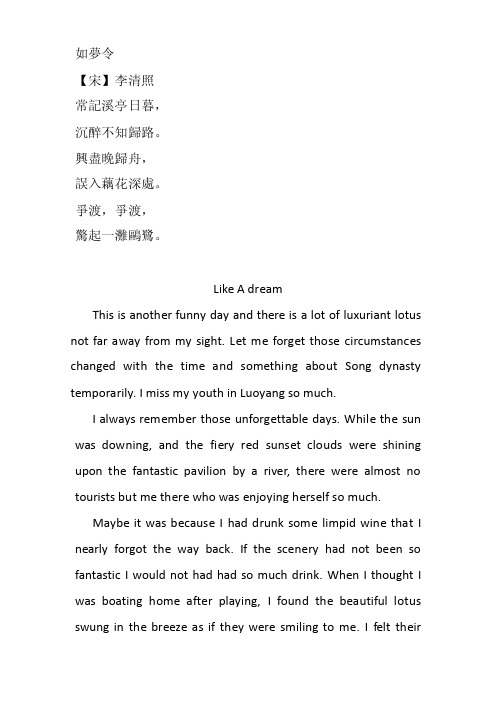
如夢令【宋】李清照常記溪亭日暮,沉醉不知歸路。
興盡晚歸舟,誤入藕花深處。
爭渡,爭渡,驚起一灘鷗鷺。
Like A dreamThis is another funny day and there is a lot of luxuriant lotus not far away from my sight. Let me forget those circumstances changed with the time and something about Song dynasty temporarily. I miss my youth in Luoyang so much.I always remember those unforgettable days. While the sun was downing, and the fiery red sunset clouds were shining upon the fantastic pavilion by a river, there were almost no tourists but me there who was enjoying herself so much.Maybe it was because I had drunk some limpid wine that I nearly forgot the way back. If the scenery had not been so fantastic I would not had had so much drink. When I thought I was boating home after playing, I found the beautiful lotus swung in the breeze as if they were smiling to me. I felt theirtender petal, smelt their joyful fragrance as the boat tipple in the lotus pond. I could not help swinging the twin screw forward.Finally I became aware of that I was in deep of lotus pond by mistake. I did not know whether to go forward or go back that time for I had already loose the direction. What I only did was trying to put forth my strength to get away. Suddenly I heard a rustle from no far away just when I felt upset. What a surprise that gulls and egrets flied frightened by me.Time flies. Youth will never come. But that time would be my happiest time in my life. The following happiness has gone with my dear husband. And now who can save my great country??。
宇文所安李清照词英译

宇文所安李清照词英译全文共四篇示例,供读者参考第一篇示例:宇文所安是宋代文学家,而李清照则是宋代最著名的女词人之一。
两位文学家的作品被称为中国古代文学史上的璀璨明珠。
他们的词作品不仅在当时广为传颂,而且至今仍被人们传唱,留传至今。
宇文所安是宋代宰执官员,兼任诗人和词人。
他的词作品以描写爱情和人生苦乐为主题,语言平实而真挚,情感饱满。
在他的作品中,常常能感受到对人生的思考和对爱情的感悟。
他的词作品常常被人称为“宋词之冠”。
李清照是宋代著名的女词人,她的词作品多以写人间爱情为中心,深情迷人,在迎合大众审美的也有极高的艺术价值。
李清照的词语清新流畅,情感真挚,给人以娓娓动听之感。
两位文学家的词作都具有深厚的文学内涵和情感表达,他们的词作品在中国文学史上具有举足轻重的地位。
以下是宇文所安与李清照词作的英译赏析。
宇文所安词作欣赏The Elegance of YouAmong the flowing riverBlossoms fall like snowYour elegance is timelessIn the moonlight's soft glow李清照词作欣赏通过以上对宇文所安和李清照的词作的英译赏析,我们可以感受到两位文学家的才华和情感表达能力。
他们的词作品在中国文学史上具有重要地位,至今仍被人们传唱,留传不朽。
希望读者能够通过这些词作品,感受到中国文学的魅力和深厚的文化底蕴。
【待续,共1000字】第二篇示例:宇文所安和李清照都是中国古代文学史上的名人,分别代表了不同的文学流派和时代。
宇文所安是唐代著名诗人,以其豪放洒脱的诗风而闻名,而李清照则是宋代著名词人,以其婉约细腻的词作而享誉后世。
本文将对这两位文学巨匠的代表作进行英译,并进行一些简要的分析和评价。
宇文所安的代表作之一是《赋得古原草送别》,这首诗描绘了离别时的深情与感伤,表达了诗人对友人的真挚思念和祝福之情。
诗中开头即以“离离原上草”描绘了离别时的凄凉之感,接着“一岁一枯荣”表达了生命的无常和变迁。
